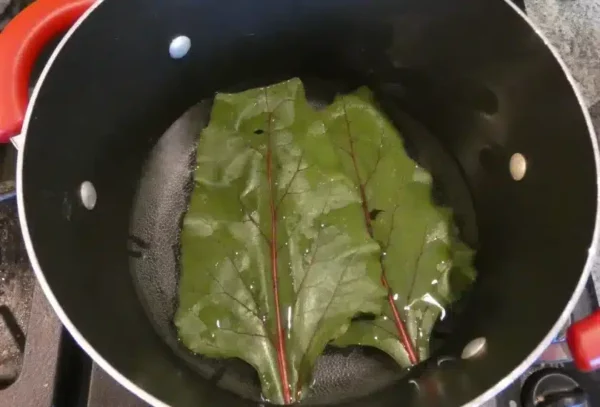Beets are well-known for their vibrant color, sweet flavor, and impressive health benefits. They’ve become a popular superfood, from beetroot juice to roasted beets in salads.
But many people don’t realize that the beet plant leaves are just as—if not more—nutritious than the root.
Beet leaves, also known as beet greens, are packed with vitamins, minerals, and antioxidants that make them a powerful addition to any diet.
In this article, we’ll explore the nutritional value and health benefits of beet leaves, how to use them in your meals, and why you should stop tossing them away!
Nutritional Value of Beet Leaves
Beet greens are low in calories but rich in essential nutrients. They contain:
- Vitamins: A, C, K, and B-complex vitamins (like folate and riboflavin)
- Minerals: Iron, magnesium, potassium, calcium, and phosphorus
- Antioxidants: Beta-carotene and lutein (important for eye health)
- Fiber: Supports digestion and regulates blood sugar
- Protein: A surprising source of plant-based protein
Beet leaves are a nutritional powerhouse, making them an excellent choice for boosting your daily intake of essential vitamins and minerals.
Health Benefits of Beet Leaves
1. Supports Heart Health
Beet leaves are rich in potassium and magnesium, which help regulate blood pressure and maintain a healthy heart. Their high fiber content also helps reduce cholesterol levels, supporting cardiovascular health.
2. Boosts Immunity
Thanks to their high levels of vitamin C, beet greens strengthen the immune system, helping the body fight off infections and reduce inflammation.
3. Improves Eye Health
Beet greens contain beta-carotene and lutein, antioxidants essential for eye health. Regular consumption can reduce the risk of macular degeneration and protect your vision as you age.
4. Supports Healthy Bones
Beet leaves are an excellent source of vitamin K, which is essential for bone strength. This vitamin helps improve calcium absorption and reduces the risk of osteoporosis.
5. Aids in Detoxification
The antioxidants in beet greens help the liver detoxify toxins from the body, promoting overall health and preventing liver disease.
6. Improves Digestion
With their high fiber content, beet leaves promote healthy digestion, prevent constipation, and support gut health. They also help maintain stable blood sugar levels, making them beneficial for people with diabetes.
7. Fights Inflammation
The anti-inflammatory properties of beet greens help relieve joint pain and reduce inflammation throughout the body, making them a good addition for those with arthritis.
How to Use Beet Leaves in Your Diet
Beet leaves are incredibly versatile and can be used in a variety of dishes, much like spinach or kale. Here are some easy ways to incorporate them into your meals:
- Sautéed Beet Greens: Sauté them with garlic, olive oil, and a pinch of salt for a quick and nutritious side dish.
- Smoothies: Add fresh beet leaves to your morning smoothie for an extra dose of vitamins and antioxidants.
- Salads: Use young, tender beet greens as a base for salads, mixed with other leafy greens.
- Soups and Stews: Add beet greens to soups and stews for a nutrient boost.
- Pasta or Stir-fry: Toss them into pasta dishes or stir-fries for added flavor and texture.
- Juicing: Blend beet leaves into fresh vegetable juices for detox benefits.
How to Store Beet Leaves
If you’ve bought a bunch of beets with the leaves attached, it’s essential to store them properly to preserve their nutrients:
- Remove the leaves from the roots right away to prevent wilting.
- Wrap the leaves in a damp paper towel and place them in a plastic bag in the fridge.
- Use them within 2-3 days for maximum freshness and nutritional value.
Why You Should Stop Throwing Away Beet Leaves
Many people discard beet leaves, thinking they are just waste. However, beet leaves are packed with nutrients that make them more healing and beneficial than the roots. By throwing them away, you’re missing out on an incredible natural remedy for heart health, digestion, and immunity.
Using the whole beet—including the leaves—not only reduces food waste but also boosts your overall health.
Precautions When Consuming Beet Leaves
While beet leaves are generally safe to eat, they contain oxalates, which can interfere with calcium absorption and may contribute to kidney stone formation in susceptible individuals. If you are prone to kidney stones, consume beet leaves in moderation.
Beet leaves are an overlooked treasure that offer far more than most people realize. With their impressive nutrient profile and healing benefits, they deserve a place in your daily diet.
